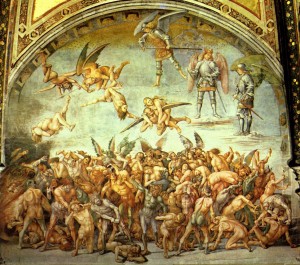 There seems to be a helluva a lot of talk about hell lately.
There seems to be a helluva a lot of talk about hell lately.
The debate about exactly what “hell” is has raged for millennia. The place — or concept of such a place of torment for unrepentant sinners — varies not only within Christianity but among the world’s other major religions. So, I presume argument about what, where, how, if, who goes there, etc. has gone on nearly as long as humankind has had language.
Or, at least as long as it has had prophets and preachers.
Then, along came Rob Bell, a pastor/author in the “emergent church” movement, and his book Love Wins: Heaven, Hell, and the Fate of Every Person Who Ever Lived. Bell questions the (literal) hellfire-and-brimstone teachings that the bulk of humanity, by rejecting Christ, will end up in fiery, eternal agony — and that has ignited (pun intended) a firestorm of condemnation and even cries that he’s committed heresy.
Bell doesn’t make conclusions about what hell is, or how long it’s punishments last, or exactly who deserves to go there. Others have. Some, like Dr. Edward Fudge, whose book The Fire That Consumes was recently released in a third edition, argues that hell is not a place of everlasting, conscious torment, but a portal to final destruction of rebellious and evil souls.
But Bell’s book drew direct response when Mark Galli, senior managing editor of Christianity Today, penned the just-released God Wins: Heaven, Hell, and Why the Good News is Better than Love Wins.
As the son of a Pentecostal minister, I knew about hell early. God is love, and he is compassionate and forgiving, Dad would preach. No sin too great that His grace cannot overcome it; bury it in the deepest sea, as far as the east is from the west, etc. BUT He also is a righteous God who, ultimately, cannot tolerate sin. God doesn’t “send” anyone to hell, Dad would insist. “We do that ourselves by what we decide to do about Christ.” To which Mom would add: “There is a heaven to gain and a hell to shun.”
(Unwittingly, she was paraphrasing Seventh Day Adventist co-founder Ellen White, who wrote: “Every soul has a heaven to win, and a hell to shun.” Oddly enough, Seventh Day Adventists, too, believe in the destruction of the wicked, not an eternal hell).
Privately, Dad, would muse about what hell was, or meant. Our fundamentalist Christian denomination taught the traditional eternal hellfire view, but he wondered — without making conclusions — if “hell” also could be just the grave, or a state of eternal separation from God where remorse could be like a fire of regret, etc.
“Whatever it is, you don’t want to go there,” Dad would conclude. He preferred to talk about heaven, where God really (really, really) wants us to be — so much so that He sent his only begotten Son to take the ultimate penalty for us on the cross. Now, that’s Love.
Me? I don’t know, and I don’t want to know much more about hell. The only real way to settle that debate is to, well, go there. I’ll pass.
Do I believe hell exists? Sure, in whatever form, it has to. Look at human history. Look at current events. We pay lip-service to faith, but our actions seem to show that as a species, humanity truly worships warfare, greed, prejudice, violence and depravity (and the latter goes far beyond mere obsession with sex).
With one hand, we comfort, with the other, we pummel. From the same lips come curses and lies, poetry and song. The same eyes that shed tears for the suffering also drink in violence on the big screen and pornography on computer monitors.
Yes, there’s hell. And it seems to me my preacher father had the right of it: A lot of us seem intent upon sending ourselves there.

